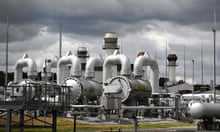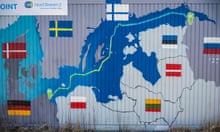Europeans should turn down their thermostats by a degree to save on gas and reduce dependency on Russian imports, which Russia is wielding as a weapon in the Ukraine war, the world’s leading energy adviser has said.
Governments in Europe should also impose a windfall tax on fossil fuel companies that have enjoyed a bonanza from soaring energy prices, and use it to cut energy bills for hard-pressed consumers, according to a 10-point plan formulated by the International Energy Agency that would reduce Russian gas imports by about a third before next winter.
The planned closure of several nuclear power stations should also be delayed, red tape should be cut to bring forward the construction of more wind and solar generation and efforts to improve energy efficiency in homes and businesses must be stepped up urgently, the IEA said.
Fatih Birol, executive director of the IEA, the global energy watchdog, said: “Russia is using its natural gas resources as an economic and political weapon. This is clear to everyone in the world.”
Adjusting home thermostats by 1C would save about 10bn cubic metres of gas within a year, a useful saving on total Russian gas imports of 155bn cubic metres, if implemented alongside the other measures. Birol said: “It would help to reduce [household] energy bills, but maintain comfort.”
The 10-point plan also includes advice to governments not to sign any new gas contracts with Russia’s state-owned energy company Gazprom, or to renew expiring deals; to set a minimum obligation on energy companies to store gas; to speed up the replacement of gas boilers with heat pumps; and to seek alternative gas supplies from elsewhere in the world.
The EU relies on Russia for about 40% of its gas consumption. Gas prices have soared to record levels in recent months, in part owing to the global economic rebound from Covid-19, but also because Russia’s president, Vladimir Putin, engineered a reduction of about 25% in Russian gas supplies to Europe in recent months, in preparation for his invasion.
Barbara Pompili, minister for ecological transition for France, holder of the EU’s revolving presidency, said: “More than ever, getting rid of Russian fossil fuels and of fossil fuels in general is essential. What is at stake is both the need to accelerate the fight against climate change and, as we can see now, the short-term energy security of the European continent.”
The European Commission will use the IEA’s proposals to inform its own plan of action on energy in response to the Ukraine war, to be published next week.
Kadri Simson, the EU’s energy commissioner, said the bloc had already been moving away from gas but that the Ukraine war made it more urgent. “Russia’s attack on Ukraine is a watershed moment,” she said.
The UK government is also understood to be urgently examining its exposure to gas market turbulence, caused by Russia’s invasion of Ukraine. The UK does not directly contract with Russia for pipeline gas, as Germany and some other EU countries do, as UK gas supplies come mainly from the North Sea, Norway and some tanker deliveries, but the impacts on the prices and availability of gas are felt internationally.
Rob Gross, director of the UK Energy Research Centre and professor of energy policy at Imperial College London, said some of the IEA’s findings could apply to the UK. “Accelerating the deployment of renewables projects, getting on with energy efficiency, [and] maximising output from nuclear stations are all no-brainers in both the UK and EU,” he said. “However, we should not expect that we can magic the capacity to retrofit our houses into existence in no time at all.”
The UK could be more exposed than its EU neighbours to gas market turbulence. The government allowed the UK’s last large-scale gas storage facility to close in 2017, despite warnings on how it would affect resilience. After Brexit, the government also opted out of an EU pact to share gas storage in the event of supply constraints.
Gross warned: “We will be reliant on attracting gas by paying the market rates. We can secure enough gas but we have to pay the price.”
Even if all of the IEA’s advice is followed, the result will be only to reduce EU need for Russian gas by about a third, leaving Europe still heavily reliant on Putin’s control of Russian fossil fuel resources.
The IEA said its advice was consistent with the EU’s plan to cut greenhouse gas emissions, the European green deal, and would not require any increase of fossil fuel use. However, if Putin were to cut European gas supplies further, causing gas prices to rise even higher than current levels, the EU could come under pressure to expand its use of coal instead of cutting it.










